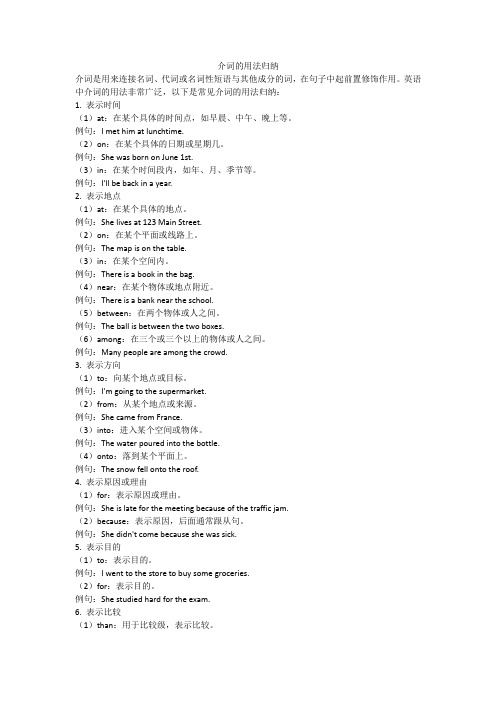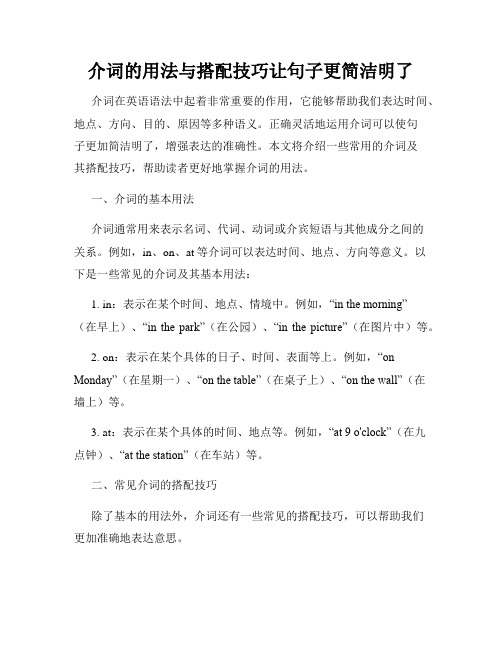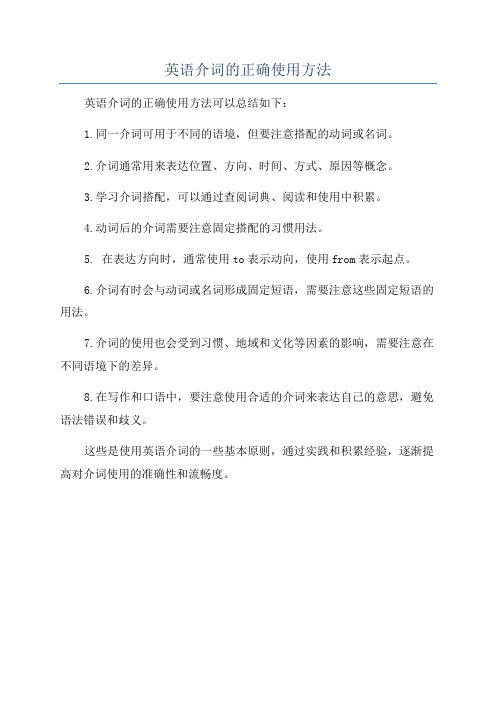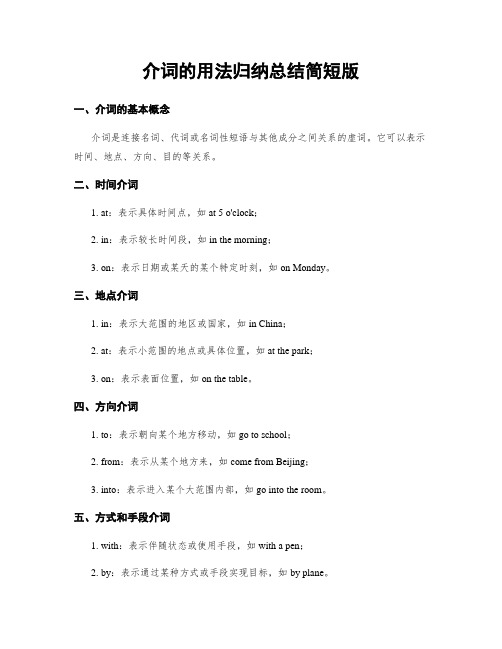职称英语考试备考:介词使用方法
职称英语考试词汇复习辅导之介词重要用法:with

职称英语考试词汇复习辅导之介词重要用法:with1.动词+ witha)动词+ with。
with接对象或目标,意思为“与…,从…”:agree with同意;适应, begin with从…开始, continue with继续,do with应付, deal with对付,fight with与…作战, fool with愚弄, hurry with忙于, mix with与…混合在一起, meet with偶遇, play with把玩, quarrel with与某人争吵,reason with与某人评理, settle with与人协商。
例如:Let’s begin our class with an English song.我们以一首英语歌开讲。
I meant to reason with you, but you won’t reason.我本要与你理论理论,但你不愿意。
b)动词+ sth./sb. + with + sth./sb.。
介词with意为“以,用”:compare with与…比较, combine with与…混合, equip with以…装备,feed with用…喂养, furnish with用…装饰, provide with提供,replace with以…替代, supply with供给。
例如:Education must be combined with productive labour.教育应与生产力相结合。
They replaced slave labour with machines.他们用机器代替奴工。
2. be +形容词/过去分词+ with。
介词with表示情绪的原因、凭借等意思:be angry with恼怒, be annoyed with使烦恼,be busy with忙于, be bored with使烦心, be burdened with担负,be crowded with拥挤着, be connected with与…联系,be covered with覆盖着, be concerned with关心, be content with对…满意, be disappointed with失望于, be delighted with对…感到高兴,be engaged with忙碌于, be exhausted with由于…而极度疲倦,be filled with充满, be familiar with熟悉, be friendly with对…友好,be occupied with忙碌, be overcome with极为, be popular with受…欢迎, be patient with对…有耐心, be pleased with对…高兴,be satisfied with满意于, be strict with对…严格,be wrong with有毛病, be wild with因…而欣喜。
英语介词用法详解

英语介词用法详解英语介词是连接词与词之间关系的重要语法成分,它们用于表示空间、时间、关系等概念。
正确的使用介词是英语学习的基础之一。
本文将详细介绍英语介词的常见用法。
一、表示方向和位置的介词1. In(在):用于大的地点范围之内,表示“在……里面”。
- There is a book on the desk.- I live in New York.2. On(在、在上、在……上面):用于平面、表面或边界之上。
- The cat is on the table.- The painting hangs on the wall.3. At(在、在……附近):用于特定的地点或位置。
- I met him at the park.- We will meet at the restaurant.4. Under(在……下面):表示相对高度或遮挡。
- The cat is under the table.- He found his keys under the sofa.5. Behind(在……后面):表示在某物后面。
- The car is parked behind the house.- She is hiding behind the tree.6. Beside(在……旁边):表示在某物的旁边。
- My house is beside the park.- She sat beside her friends.7. Inside(在……里面):表示在某物的内部。
- The wallet is inside the bag.- There is a surprise inside the box.8. Outside(在……外面):表示在某物的外部。
- The children are playing outside the house.- Don't forget to lock the door when you go outside.二、表示时间的介词1. On(在某天):用于特定的日期。
介词的用法归纳

介词的用法归纳介词是用来连接名词、代词或名词性短语与其他成分的词,在句子中起前置修饰作用。
英语中介词的用法非常广泛,以下是常见介词的用法归纳:1. 表示时间(1)at:在某个具体的时间点,如早晨、中午、晚上等。
例句:I met him at lunchtime.(2)on:在某个具体的日期或星期几。
例句:She was born on June 1st.(3)in:在某个时间段内,如年、月、季节等。
例句:I'll be back in a year.2. 表示地点(1)at:在某个具体的地点。
例句:She lives at 123 Main Street.(2)on:在某个平面或线路上。
例句:The map is on the table.(3)in:在某个空间内。
例句:There is a book in the bag.(4)near:在某个物体或地点附近。
例句:There is a bank near the school.(5)between:在两个物体或人之间。
例句:The ball is between the two boxes.(6)among:在三个或三个以上的物体或人之间。
例句:Many people are among the crowd.3. 表示方向(1)to:向某个地点或目标。
例句:I'm going to the supermarket.(2)from:从某个地点或来源。
例句:She came from France.(3)into:进入某个空间或物体。
例句:The water poured into the bottle.(4)onto:落到某个平面上。
例句:The snow fell onto the roof.4. 表示原因或理由(1)for:表示原因或理由。
例句:She is late for the meeting because of the traffic jam.(2)because:表示原因,后面通常跟从句。
职称英语考试备考:介词使用方法.docx

职称英语考试备考:介词使用方法早、午、晚要用in例:in the morning 在早上in the after noon 在下午in the evening 在晚上in the day 在白天at黎明、午、夜、点与分例:at dawn , at daybreak在黎明时候at noon在中午at night在夜间at midnight 在午夜以上短语都不用冠词at six o 'clock 在6 点钟at 7 : 30 (seven thirty)在7 点半at half past eleven 在11 点半at nine fifteen 在9 点15 分at ten thirty a.m.在上午10 点30 分也可以写成seven to five 5点差7分(半小时以上)five minutes after two 2 点过5 分at a quarter to two 1 点45 分at the weekend 在周末年、月、年月、季节、周即在〃来年",在〃某月",在"某年某月"(但在某年某月某日则用on),在四季,在第几周等都要用in.例;in 1986 在1986年in 1927 在1927年in April在四月in March在三月in December 1986 1986 年12 月in July 1983 1983 年7 月in spring 在春季in summer在夏季in autumn 在秋季in winter在冬季in the fist week of this semester 这学期的第一周in the third week 在第三周阳光、灯、影、衣、冒in ,即在阳光下,在灯下,在树阴下,穿衣、着装、冒雨等都要用in.例:Don 't read in dim light.切勿在暗淡的灯光下看书。
They are reviewing their lessons in the bright light.他们在明亮的灯光下复习功课。
介词的用法与搭配技巧让句子更简洁明了

介词的用法与搭配技巧让句子更简洁明了介词在英语语法中起着非常重要的作用,它能够帮助我们表达时间、地点、方向、目的、原因等多种语义。
正确灵活地运用介词可以使句子更加简洁明了,增强表达的准确性。
本文将介绍一些常用的介词及其搭配技巧,帮助读者更好地掌握介词的用法。
一、介词的基本用法介词通常用来表示名词、代词、动词或介宾短语与其他成分之间的关系。
例如,in、on、at等介词可以表达时间、地点、方向等意义。
以下是一些常见的介词及其基本用法:1. in:表示在某个时间、地点、情境中。
例如,“in the morning”(在早上)、“in the park”(在公园)、“in the picture”(在图片中)等。
2. on:表示在某个具体的日子、时间、表面等上。
例如,“on Monday”(在星期一)、“on the table”(在桌子上)、“on the wall”(在墙上)等。
3. at:表示在某个具体的时间、地点等。
例如,“at 9 o'clock”(在九点钟)、“at the station”(在车站)等。
二、常见介词的搭配技巧除了基本的用法外,介词还有一些常见的搭配技巧,可以帮助我们更加准确地表达意思。
1. 表示位置关系:介词常用来表示物体或人在空间中的位置关系。
例如,“in front of”(在...前面)、“behind”(在...后面)、“next to”(在...旁边)、“above”(在...上面)、“under”(在...下面)等。
2. 表示原因与结果:介词也可以用来表示原因与结果的关系。
例如,“because of”(因为)、“due to”(由于)、“result from”(由...引起)等。
3. 表示方式与手段:介词可以表示某种方式或手段。
例如,“by”(通过)、“with”(用)等。
例如,“by email”(通过电子邮件)、“with a knife”(用刀)等。
英语介词的正确使用方法

英语介词的正确使用方法
英语介词的正确使用方法可以总结如下:
1.同一介词可用于不同的语境,但要注意搭配的动词或名词。
2.介词通常用来表达位置、方向、时间、方式、原因等概念。
3.学习介词搭配,可以通过查阅词典、阅读和使用中积累。
4.动词后的介词需要注意固定搭配的习惯用法。
5. 在表达方向时,通常使用to表示动向,使用from表示起点。
6.介词有时会与动词或名词形成固定短语,需要注意这些固定短语的用法。
7.介词的使用也会受到习惯、地域和文化等因素的影响,需要注意在不同语境下的差异。
8.在写作和口语中,要注意使用合适的介词来表达自己的意思,避免语法错误和歧义。
这些是使用英语介词的一些基本原则,通过实践和积累经验,逐渐提高对介词使用的准确性和流畅度。
介词的用法归纳总结简短版

介词的用法归纳总结简短版一、介词的基本概念介词是连接名词、代词或名词性短语与其他成分之间关系的虚词。
它可以表示时间、地点、方向、目的等关系。
二、时间介词1. at:表示具体时间点,如at 5 o'clock;2. in:表示较长时间段,如in the morning;3. on:表示日期或某天的某个特定时刻,如on Monday。
三、地点介词1. in:表示大范围的地区或国家,如in China;2. at:表示小范围的地点或具体位置,如at the park;3. on:表示表面位置,如on the table。
四、方向介词1. to:表示朝向某个地方移动,如go to school;2. from:表示从某个地方来,如come from Beijing;3. into:表示进入某个大范围内部,如go into the room。
五、方式和手段介词1. with:表示伴随状态或使用手段,如with a pen;2. by:表示通过某种方式或手段实现目标,如by plane。
六、比较和区别介词1. than:用于比较级中,表示比较对象之间的差异,如better than;2. between:两者之间的区别或选择,如choose between A and B。
七、目的和结果介词1. for:表示为了某个目的或目标,如study for the test;2. to:表示想要达到的结果,如go to sleep。
八、关系介词1. of:表示所属关系或从属关系,如a friend of mine;2. with:表示某种关系或联系,如be familiar with。
九、其他常见介词1. about:表示关于某事,如talk about the news;2. through:穿过某个空间或经过某个过程,如drive through the tunnel;3. after:在某事之后发生,如after school。
职称英语介词及其词组的用法

职称英语介词及其词组的用法介词又称作前置词,表示名词、代词等与句中其他词的关系,在句中不能单独作句子成分。
介词后面一般有名词、代词或相当于名词的'其他词类、短语或从句作它的宾语,表示与其他成分的关系。
介词和它的宾语构成介词词组,在句中作状语,表语,补语,定语或介词宾语。
介词可以分为时间介词、地点介词、方式介词、原因介词、数量介词和其他介词。
以下是为大家的介词及其词组的用法,希望对大家有所帮助。
adjust to适应,attend to处理;照料, agree to赞同,amount to加起来达…,belong to属于, e to到达, drink to 为…干杯,get to到达, happen to发生在某人身上, hold to紧握, lead to通向, listen to听, our to想起, object to 反对, point to指向, respond to答复, refer to参考;指的是…;涉及, reply to答复, see to负责, stick to坚持,turn to求助, write to给某人写信。
announce to某人, describe to向某人描述, explain to向某人解释, express to对某人表达, mention to提及, nod to向某人点头, report to报告, say to告知, shout to对某人大叫, suggest to对某人提建议,speak to与某人交谈, talk to跟某人谈话, whisper to和某人低声耳语。
add to增加, pare to比作, carry to运送至, devote to 致力于,introduce to介绍给, invite to邀请参加, join to连接到, leave to委托给,reduce to下降至, sentence to判处, take to带到。
- 1、下载文档前请自行甄别文档内容的完整性,平台不提供额外的编辑、内容补充、找答案等附加服务。
- 2、"仅部分预览"的文档,不可在线预览部分如存在完整性等问题,可反馈申请退款(可完整预览的文档不适用该条件!)。
- 3、如文档侵犯您的权益,请联系客服反馈,我们会尽快为您处理(人工客服工作时间:9:00-18:30)。
职称英语考试备考:介词使用方法早、午、晚要用in
例:in the morning 在早上
in the afternoon 在下午
in the evening 在晚上
in the day 在白天
at黎明、午、夜、点与分
例:at dawn,at daybreak 在黎明时候
at noon 在中午
at night 在夜间
at midnight 在午夜
以上短语都不用冠词
at six o‘clock 在6点钟
at 7:30 (seven thirty) 在7点半
at half past eleven 在11点半
at nine fifteen 在9点15分
at ten thirty a.m. 在上午10点30分
也可以写成
seven to five 5点差7分(半小时以上)
five minutes after two 2点过5分
at a quarter to two 1点45分
at the weekend 在周末
年、月、年月、季节、周
即在“来年”,在“某月”,在“某年某月” (但在某年某月某日则用on),在四季,在第几周等都要用in.
例;in 1986 在1986年
in 1927 在1927年
in April 在四月
in March 在三月
in December 1986 1986年12月
in July l983 1983年7月
in spring 在春季in summer 在夏季
in autumn 在秋季in winter 在冬季
in the fist week of this semester 这学期的第一周
in the third week 在第三周
阳光、灯、影、衣、冒in,
即在阳光下,在灯下,在树阴下,穿衣、着装、冒雨等都要用in.
例:Don‘t read in dim light. 切勿在暗淡的灯光下看书。
They are reviewing their lessons in the bright light. 他们在明亮的灯光下复习功课。
They are sitting in the shade of a tree. 他们坐在树阴下乘凉。
a prisoner in irons 带着镣铐的囚犯
He went in the rain to meet me at the station. 他冒雨到车站去接我。
以及:in the bright sunlight 在明亮的阳光下
a merchant in disguise 乔装的商人
the woman in white (black,red,yellow) 穿着白(黑、红、黄)色衣服的妇女
in uniform 穿着制服
in mourning 穿着丧服
in brown shoes 穿着棕色鞋
in his shirt sleeves 穿着衬衫
将来时态in……以后
例:They will come back in 10 days. 他们将10天以后回来。
I‘ll come round in a day or two. 我一两天就回来。
We‘ll be back in no time. 我们一会儿就回来。
Come and see me in two days‘ time. 两天后来看我。
(从现在开始)
after…… (从过去开始)
小处at大处in
例:Li and I arrived at Heishan county safe and sound,all is well. Don‘t worry. 李和我平安地到达黑山县,一切很好,勿念。
I live in a great city (big city),my sister lives at a small town while my parents live at a village. 我住在大城市,我姐姐住在一个小城镇,而我的父母则住在农村。
I‘m in Liaoning,at Anshan. 我住在辽宁省鞍山市。
有形with无形by,语言、单位、材料in
例:The workers are paving a road with stone. 工人们正用石子铺路。
(有形)
The teacher is correcting the paper with a new pen. 这位教师正用一支新笔批改论文。
(有形)
“Taking Tiger Mountain by Strategy” is a good opera. 《智取威虎山》是-出好戏。
(无形)
The product is separated by distilation into gasoline and gas oil. 这种产品是用蒸馏分离出气油和粗柴油。
(表示方式、手段、方法-无形)
I really can‘t express my idea in English freely in-deed. 我确实不能用英语流利地表达我的思想。
(表示某种语言用in)
I wrote a novel in Russian. 我用俄语写了一本小说。
(同上)
The kilometer is the biggest unit of length in the metric system. 公里是米制中最长的长度单位。
(表示度、量、衡单位的用in )
The length is measured in meter,kilometre,and centimetre. 长度是以米、公里、厘米为单位来计算的。
(同上)
This board was cast in bronze not in gold. 这个牌匾是铜铸的,不是金铸的。
特征、方面与方式、心情、成语惯用in
特征或状态:
例:The Democratic Party was then in power. 那时民主党执政。
They found the patient in a coma. 他们发现病人处于昏迷状态。
He has not been in good health for some years. 他几年来身体一直不好。
Many who came in despair went away in hope. 许多人带着绝望情绪而来,却满怀希望而去。
The house was in ruins. 这房屋成了废墟。
The poor girl was in tears. 这个贫苦女孩泪流满面。
Her clothes were in rags. 她的衣跟穿破了。
His shoes were in holes. 他的鞋穿出窟窿了。
I only said it in fun. 我说这话只是开玩笑的。
She spoke in grief rather than in anger. 与其说她讲得很气愤,不如说她讲得很伤心。
还有一些短语也用in,如:
in jest 诙谐地,in joke 开玩笑地,in spite 恶意地,in fairness 公正地,in revenge 报复,in mercy 宽大,in sorrow 伤心地等。
His mind was in great confusion. 他脑子里很乱。
Today everybody is in high spirits and no one is in low ebb. 今天大家都兴高采烈,没有一个情绪低落的。
She and her classmates are in flower ages. 她和她的同学都正值妙龄。
方面:
例:we accepted the item in principle. 我们在原则上接受了这个条款。
They are never backward in giving their views. 他们从来不怕发表自己的意见。
The backward area has achieved self-sufficient in grain. 这个落后的地区在粮食方面已能自给。
A good teacher must be an example in study. 一个好的教师必须是学习的模范。
方式:
例:All the speeches were taken down in shorthand. 所有报告都用速记记录下来了。
更多职称英语考试免费资料请访问“新东方在线职称英语频道”。
